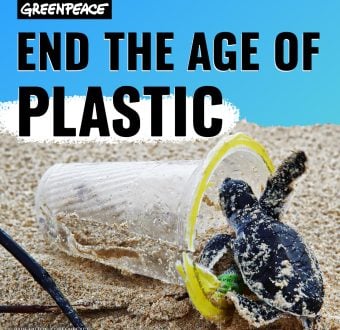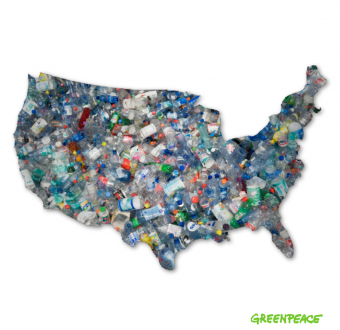Washington, DC – According to documents obtained by Unearthed, Greenpeace UK’s investigative platform, the oil and chemical industry is lobbying against a landmark global proposal on microplastics chemicals, and a senior Environmental Protection Agency (EPA) official during both the Trump and Biden administrations appears to be supporting the industry’s position. The Daily Mail broke the news this morning posing the question, “Is this the end of plastic?,” illustrating the threat the proposal could pose to industry.
“While you might expect Trump’s EPA to align with the oil and chemical industry against protections for the American people from potentially harmful plastic chemicals, the Biden Administration must do better,” said Greenpeace USA Oceans Campaign Director John Hocevar. “As much of the world works to take action to address the impacts of the plastic pollution crisis, the U.S. government should be stepping forward to lead, not echoing the world’s worst polluters.”
Last year, the Swiss government put forward a proposal to list a widely-used plastic additive in the Stockholm Convention, the UN’s global treaty on persistent organic pollutants. It’s the first proposal to make a case for a chemical to be listed partly on the basis that it travels long distances via microplastics and plastic debris. Relatively little research has been done on the chemical, called UV-328, which is often used in plastic products, rubber, paints, coatings and cosmetics to protect them from UV damage. Scientists are concerned that it does not break down easily in the environment, accumulates in organisms and may cause harm to wildlife or human health.
In response to an email on the proposal forwarded by the American Chemistry Council (ACC) in April 2019, the senior EPA official responded: “Wow – that’s quite a precedent. Holy moly,” and, “Welcome to our future.” The same official appears to still be leading the EPA’s work on the issue under the Biden administration, which is pushing back against the proposal. The EPA told Unearthed that its views were based on a technical review by scientists.
Microplastic pollution has been found in oceans, lakes, rivers, raindrops, air, wildlife and even our dinner plates. Study after study has shown it can release harmful chemicals and attract other pollutants already present in seawater, ending up in the guts of marine life and further up the food chain.
Listing UV-328 in the Stockholm Convention could lead to bans on its production or use, and could be a landmark for the regulation of chemicals in microplastics. The chemical is just one of many added in the plastic manufacturing process, which some scientists are now concerned could spread far and wide via microplastics, posing potential risks to wildlife, human health or the environment.
At a meeting in January, the Convention’s scientific committee agreed that there is sufficient evidence on UV-328 to meet the Convention’s initial criteria to be considered a persistent organic pollutant. In September the proposal will go forward to the next stage of the process, where the committee will produce a risk profile to decide whether the additive poses enough risk to warrant global action.
The entire Unearthed story is available here: https://unearthed.greenpeace.
###
Contact: Perry Wheeler, Greenpeace USA Senior Communications Specialist, P: 301-675-8766


